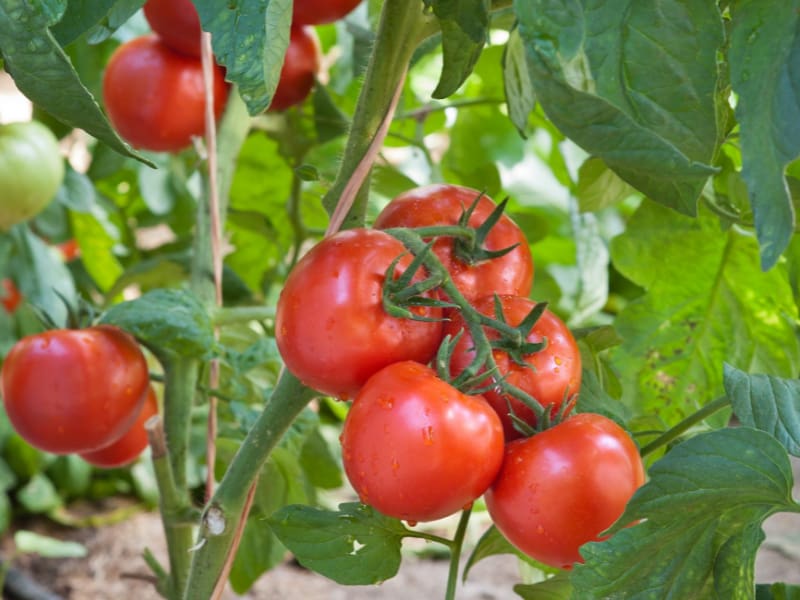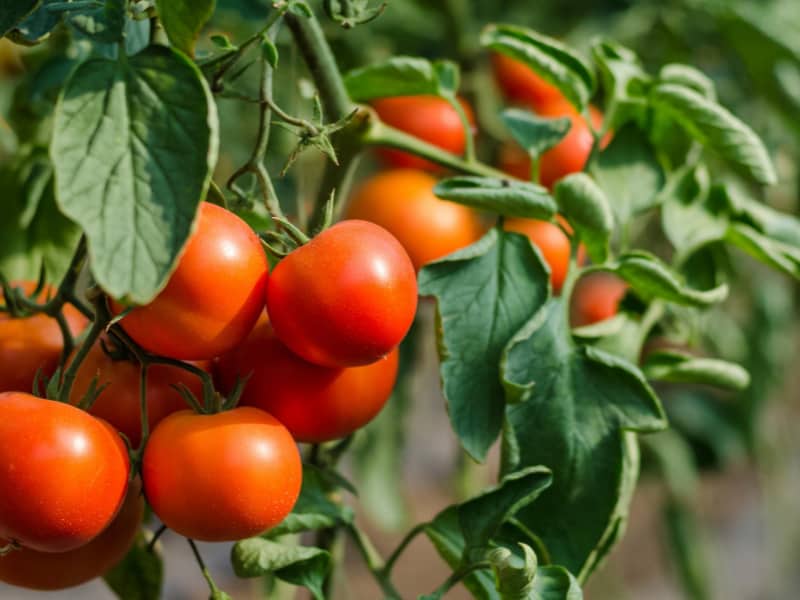Tomatoes are delicious, nutritious, and versatile. They can be used as a vegetable, fruit, sauce, soup, salad topping, pizza topping, pasta topping, meat topping, and even a drink ingredient.
There are many types of tomatoes, and each type has its own unique characteristics. Some are sweet, others are sour, and some are spicy. But with all its uses, is tomato a fruit or vegetable?
Well, it depends on who you ask and how you look at the tomato or how you plan to use it.
This guide will explain why tomatoes are either fruits or vegetables depending on certain factors, including the classification of fruits and vegetables.

Is Tomato a Fruit or a Vegetable?
The tomato is technically a fruit and vegetable. The confusion often comes in the definition of fruit vs vegetable, as well as the botanical terms or culinary application of the tomato. The US Supreme Court declares the tomato a vegetable, while the European Union declares it a fruit.
Botanists consider a fruit as any type of growth developing from the ovary of a seed plant flower that has been fertilized. Many items that we consider vegetables will be considered fruits by botanists according to the botanical definition. These include pumpkins, beans, kernels of corn, and tomatoes.
A vegetable, on the other hand, is another part of a plant that can be eaten, like the leaves, roots and stems. Examples of vegetables include potatoes, broccoli, onions, and lettuce to name but a few.
The battle of the tomato as a fruit or vegetable in the U.S. goes all the way back to the 1890s. A large quantity of West Indian tomatoes landed in New York’s port in 1886.
A customs official, citing the 1883 Tariff Act, demanded a 10% tax which made it mandatory for all foreign vegetable imports to pay the required duty. The importer, a certain John Nix, resisted because botanically the tomato was a fruit and Nix knew something of botany.
Believe it or not, the case was heard by the Supreme Court, and one Justice Horace Gray ruled the tomato is in fact a vegetable because for culinary purposes tomatoes were not used as deserts, but for dinner.
This was not the only case where the Supreme Court determined fruit or vegetable, and as recently as 2001, the European Union declared the tomato a fruit.
So, it may depend a bit on what side of the Atlantic you are sitting on, or if you are discussing this with a chef or a farmer.
Why Are Tomatoes Fruit?
The botanical classification of a tomato will consider the function and how it was grown. The tomato will grow from yellow flowers and grow many seeds inside.
Fruit will contain seeds necessary for a plant’s reproduction and, more often than not, is sweet in flavor. Although fruit can be tart, it will generally have a texture that is soft to the touch.
So, botanically tomatoes are indeed a fruit as they grow from flowers and contain quite a number of seeds. When these seeds are harvested, they can be used to cultivate new tomato plants.
Even those few tomato cultivar varieties that have been engineered to not produce seeds will still fall into the fruit category for botanists.

Why Are Tomatoes Vegetables?
When using the culinary classification for fruit or vegetables, the tomato undergoes a significant about-face.
The tomato is referred to as a vegetable, based on its flavor and use in culinary dishes.
Generally speaking, in the culinary world, tomatoes are used alone or together with other vegetables, so they have earned their place in culinary practice as a vegetable. No one would think of eating a tomato as a dessert fruit.
- Related article: Do Vegetables Contain Seeds?
Health Benefits of Tomatoes
Tomatoes are packed full of lycopene, which accounts for their bright red color while offering protection from the sun’s UV rays. This same element helps protect cells in the human body from damage.
Tomatoes are also packed with vitamins, including vitamins A, B, C, E, and K, as well as potassium among other essential nutrients. So, this fruit-vegetable has a lot to offer in the way of health benefits.
Here are some of the top benefits of tomatoes:
1. Prevent Blood Clotting
Tomatoes contribute to lowering cholesterol levels and impede blood vessels from clotting. Research suggests that tomatoes can assist in preventing strokes. They also lower inflammation in the body and give much-needed boosts to the immune system.
2. Helps Digestive Issues
Both the fiber and fluid in tomatoes can help those suffering from constipation. However, if you eat many tomatoes, its acidity can complicate acid reflux and indigestion for those prone to heartburn.
3. Protect the Eyes
Tomatoes contain beta-carotene, lutein, and zeaxanthin which can aid in protecting your eyes from the blue light typically produced by computers, smartphones, or other digital devices.
Tomatoes also help protect eyes from eyestrain that lead to headaches. Research also suggests that they play a role in macular degeneration caused by aging.
4. Helps Prevent Heart Disease and High Blood Pressure
Lycopene is known to lower bad cholesterol known as LDL and may influence blood pressure. With lower cholesterol and lower blood pressure, you will be less at risk for heart disease.
Vitamins B and E, as well as the flavonoid antioxidants, that are contained in tomatoes will contribute to heart health as well.
Research also suggests that tomatoes may assist those suffering from Type 2 Diabetes which doubles the risk of stroke and heart attacks.
When patients added cooked tomatoes to their diets for 30 days, they saw less lipid peroxidation when free radicals attack fat in the body. Lipid peroxidation causes damage that will increase the risk for heart disease.
5. Improves Immune System
This powerful antioxidant, Lycopene, contrasts the free radicals that damage cells in the body and negatively affect the immune system.
This may aid in preventing disease in fundamental organs like the colon or pancreas, as well as in the mouth, throat, cervix, and breast.
Tomatoes, which are high in Lycopene, contribute to being less at risk for stomach, lung, ovarian, or prostate cancers.
6. Protects the Lungs
Some research indicates that tomatoes are helpful to those suffering from asthma and may contribute to preventing emphysema, which gradually destroys the lungs’ air sacs.
Lycopene together with lutein and zeaxanthin fight elements found in tobacco smoke, a leading cause of emphysema.
7. Protects the Skin
While not a sunscreen, scientists do believe that Lycopene works from the inside out, aiding in skin protection from the sun’s harmful UV rays much as it does for the tomato hanging on the vine.
Research in 2011 suggests that olive oil and tomato paste increase the production of procollagen, which boosts epidermic structure.
8. Protects Teeth and Gums
Research has also demonstrated that Lycopene aids in gingivitis and periodontitis, both diseases of the gum, by protecting your teeth and gums from free radicals.
The only downside is that if you eat a lot of raw tomatoes often, the acidity may damage tooth enamel.
Tomatoes Are Fruits and Vegetables Final Thoughts
Botanically, the tomato is a fruit because it forms from a bloom and has many seeds. In cooking, however, tomatoes are considered vegetables. The law, based on the 1893 Supreme Court ruling, states that the tomato is considered a vegetable based on its use in culinary dishes.
Considering that for farmers they are fruits, and for chefs they are vegetables, it would be appropriate to say that the tomato is both a fruit and a vegetable.
If you love tomatoes, it doesn’t really matter if it’s a fruit or vegetable. They are nutritious, offer multiple health benefits, and are delicious at the same time. Bon Appétit!
For more articles on whether something is a fruit or vegetable, check these out:

